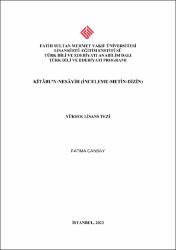Kitâbu'n-Nesâyih (İnceleme-Metin-Dizin)
Citation
CANBAY, Fatma, Kitâbu'n-Nesâyih (İnceleme-Metin-Dizin), Fatih Sultan Mehmet Vakıf Üniversitesi Lisansüstü Eğitim Enstitüsü Türk Dili ve Edebiyatı Anabilim Dalı Türk Dili ve Edebiyatı Programı, Yayımlanmamış Yüksek Lisans Tezi, İstanbul 2023.Abstract
Hâlvetî tarikatının önemli şeyhlerinden ve asıl adı Cemâleddin Mahmud olan Hulvî Cemâleddin, VXII. yüzyılın önemli mutasavvıf şairlerinden biridir. Bu çalışmada, yazarın bilinen tek nüshası olan Kitâbu’n-Nesâyih adlı eserinin incelemesi yapılmıştır.
Çalışma; Giriş, İnceleme, Metin, Dizin/Sözlük adı altında dört ana bölümden oluşmaktadır.
Giriş kısmında; dönemin Türkçesi, müellif ve eserleri, eserin içeriğinin daha iyi anlaşılması açısından da nasihat-nâmeler hakkında bilgiler verilmiştir.
İnceleme bölümünde metin; yazım, ses bilgisi ve biçim bilgisi başlıkları altında ele alınarak incelenmiştir.
Metin bölümünde Arap harfli metin transkribe edilmiştir. Metinde Arapça ve Farsça şiirler, ayet ve hadisler Arap harfleriyle yazılmıştır.
Dizin/Sözlük bölümünde metindeki kelimeler, metinde geçen anlamlarıyla verilerek alfabetik sıraya göre dizilmiş, varak ve satır numaraları verilmiştir.
Sonuç kısmında; eserde elde edilen bulgulardan bahsedilmiş ve bu doğrultuda kısa bir değerlendirme yapılmıştır. Hulvî Cemâleddin, whose real name was Cemâleddin Mahmud and one of the important sheikhs of the Halveti order, VXI. He is one of the most important Sufi poets of the 20th century. In this study, the only known copy of the author, Kitâbu'n-Nesâyih, was analyzed.
Study; Apart from the Preface, Introduction and Conclusion, it consists of three main parts under the name of Review-Text-Index/Dictionary.
In the entrance part; In order to better understand the Turkish of the period, the author and his works, and the content of the work, information is given about the advice-nâmes.
The text in the review section; are shown under the headings of spelling, phonology and morphology.
In the text section, the text in Arabic letters is transcribed. In the text, Arabic and Persian poems, verses and hadiths are written exactly in Arabic letters.
In the Index/Dictionary section, the words in the text are given with their meanings in the text, arranged in alphabetical order, and leaf and line numbers are given.
In the conclusion part; The findings obtained in the work were mentioned and a short evaluation was made in this direction.



















